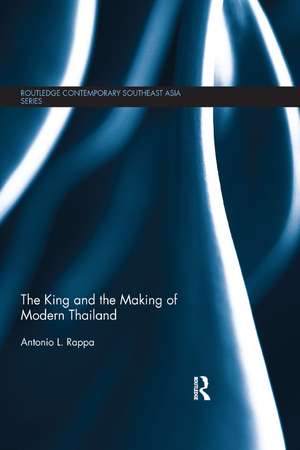The King and the Making of Modern Thailand: Routledge Contemporary Southeast Asia Series
Autor Antonio Rappaen Limba Engleză Paperback – 23 ian 2019
This book examines the role of Rama IX and the variegated set of problems that persist in life under the great white elephant and mango trees. Rappa draws from his primary research that includes interviews, surveys and first-hand observations of a remarkable kingdom and a uniquely remarkable king to reveal the internal security threats to democracy and civil society in the oldest Southeast Asian kingdom in late modernity.
| Toate formatele și edițiile | Preț | Express |
|---|---|---|
| Paperback (1) | 416.22 lei 6-8 săpt. | |
| Taylor & Francis – 23 ian 2019 | 416.22 lei 6-8 săpt. | |
| Hardback (1) | 1004.20 lei 6-8 săpt. | |
| Taylor & Francis – 7 apr 2017 | 1004.20 lei 6-8 săpt. |
Din seria Routledge Contemporary Southeast Asia Series
-
 Preț: 310.84 lei
Preț: 310.84 lei -
 Preț: 310.65 lei
Preț: 310.65 lei -
 Preț: 281.72 lei
Preț: 281.72 lei -
 Preț: 310.95 lei
Preț: 310.95 lei -
 Preț: 317.63 lei
Preț: 317.63 lei -
 Preț: 310.96 lei
Preț: 310.96 lei -
 Preț: 320.51 lei
Preț: 320.51 lei -
 Preț: 151.94 lei
Preț: 151.94 lei -
 Preț: 340.62 lei
Preț: 340.62 lei -
 Preț: 318.65 lei
Preț: 318.65 lei - 18%
 Preț: 1058.79 lei
Preț: 1058.79 lei - 18%
 Preț: 1055.21 lei
Preț: 1055.21 lei -
 Preț: 412.57 lei
Preț: 412.57 lei - 41%
 Preț: 238.48 lei
Preț: 238.48 lei - 18%
 Preț: 1054.58 lei
Preț: 1054.58 lei - 18%
 Preț: 1111.51 lei
Preț: 1111.51 lei - 18%
 Preț: 1062.98 lei
Preț: 1062.98 lei - 18%
 Preț: 1166.49 lei
Preț: 1166.49 lei - 18%
 Preț: 1056.28 lei
Preț: 1056.28 lei -
 Preț: 410.28 lei
Preț: 410.28 lei - 18%
 Preț: 1060.25 lei
Preț: 1060.25 lei - 18%
 Preț: 1060.52 lei
Preț: 1060.52 lei - 18%
 Preț: 1057.75 lei
Preț: 1057.75 lei - 18%
 Preț: 708.67 lei
Preț: 708.67 lei - 26%
 Preț: 821.10 lei
Preț: 821.10 lei - 18%
 Preț: 1060.87 lei
Preț: 1060.87 lei - 18%
 Preț: 1057.05 lei
Preț: 1057.05 lei - 25%
 Preț: 825.43 lei
Preț: 825.43 lei - 15%
 Preț: 707.79 lei
Preț: 707.79 lei - 18%
 Preț: 1058.86 lei
Preț: 1058.86 lei - 18%
 Preț: 1280.80 lei
Preț: 1280.80 lei - 25%
 Preț: 824.17 lei
Preț: 824.17 lei - 18%
 Preț: 1000.61 lei
Preț: 1000.61 lei - 28%
 Preț: 820.56 lei
Preț: 820.56 lei - 18%
 Preț: 1064.01 lei
Preț: 1064.01 lei - 18%
 Preț: 736.24 lei
Preț: 736.24 lei - 18%
 Preț: 1164.92 lei
Preț: 1164.92 lei - 18%
 Preț: 1217.95 lei
Preț: 1217.95 lei - 26%
 Preț: 848.03 lei
Preț: 848.03 lei - 18%
 Preț: 1053.47 lei
Preț: 1053.47 lei - 18%
 Preț: 1057.75 lei
Preț: 1057.75 lei - 18%
 Preț: 1053.92 lei
Preț: 1053.92 lei - 18%
 Preț: 1106.02 lei
Preț: 1106.02 lei - 18%
 Preț: 1057.05 lei
Preț: 1057.05 lei - 18%
 Preț: 1060.52 lei
Preț: 1060.52 lei -
 Preț: 428.63 lei
Preț: 428.63 lei -
 Preț: 385.25 lei
Preț: 385.25 lei - 18%
 Preț: 1057.75 lei
Preț: 1057.75 lei
Preț: 416.22 lei
Nou
Puncte Express: 624
Preț estimativ în valută:
79.65€ • 82.85$ • 65.76£
79.65€ • 82.85$ • 65.76£
Carte tipărită la comandă
Livrare economică 14-28 aprilie
Preluare comenzi: 021 569.72.76
Specificații
ISBN-13: 9780367141837
ISBN-10: 0367141833
Pagini: 284
Ilustrații: 1 Line drawings, black and white; 3 Tables, black and white; 1 Illustrations, black and white
Dimensiuni: 156 x 234 x 16 mm
Greutate: 0.45 kg
Ediția:1
Editura: Taylor & Francis
Colecția Routledge
Seria Routledge Contemporary Southeast Asia Series
Locul publicării:Oxford, United Kingdom
ISBN-10: 0367141833
Pagini: 284
Ilustrații: 1 Line drawings, black and white; 3 Tables, black and white; 1 Illustrations, black and white
Dimensiuni: 156 x 234 x 16 mm
Greutate: 0.45 kg
Ediția:1
Editura: Taylor & Francis
Colecția Routledge
Seria Routledge Contemporary Southeast Asia Series
Locul publicării:Oxford, United Kingdom
Public țintă
Postgraduate and UndergraduateCuprins
Table of Contents
Atypical Hierarchy of Thai Chinese Organized Crime Syndicate
Preface
1.Chapter 1: Rise of the King: From Absolute Rule to Constitutional Monarchy
2.Chapter 2: Nationalism, the State and Corruption
3.Chapter 3: Kingdom of Violence
4.Chapter 4: Chor rat bang luang: Religion, Corruption and Nepotism in Thailand
5.Chapter 5: Economic Security and Political Survival
6.Chapter 6: Female Sex Workers in Bhumibol’s Kingdom
7.Chapter 7: The Good, the Bad and the Ugly: Rama IX, Tak Sin the Great, and Thaksin Shinawatra
8.Chapter 8: The Ninth Rama
Reference
Appendix
Index
Atypical Hierarchy of Thai Chinese Organized Crime Syndicate
Preface
1.Chapter 1: Rise of the King: From Absolute Rule to Constitutional Monarchy
2.Chapter 2: Nationalism, the State and Corruption
3.Chapter 3: Kingdom of Violence
4.Chapter 4: Chor rat bang luang: Religion, Corruption and Nepotism in Thailand
5.Chapter 5: Economic Security and Political Survival
6.Chapter 6: Female Sex Workers in Bhumibol’s Kingdom
7.Chapter 7: The Good, the Bad and the Ugly: Rama IX, Tak Sin the Great, and Thaksin Shinawatra
8.Chapter 8: The Ninth Rama
Reference
Appendix
Index
Notă biografică
Antonio L. Rappa is Associate Professor and Head of Management and Security Studies at Singapore University of Social Sciences (SUSS), Singapore.
Descriere
This book examines the role of Rama IX and the variegated set of problems that persist in life under the great white elephant and mango trees. Rappa draws from his primary research that includes interviews, surveys and first-hand observations of a remarkable kingdom and a uniquely remarkable king to reveal the internal security threats to democracy and civil society in the oldest Southeast Asian kingdom in late modernity.
